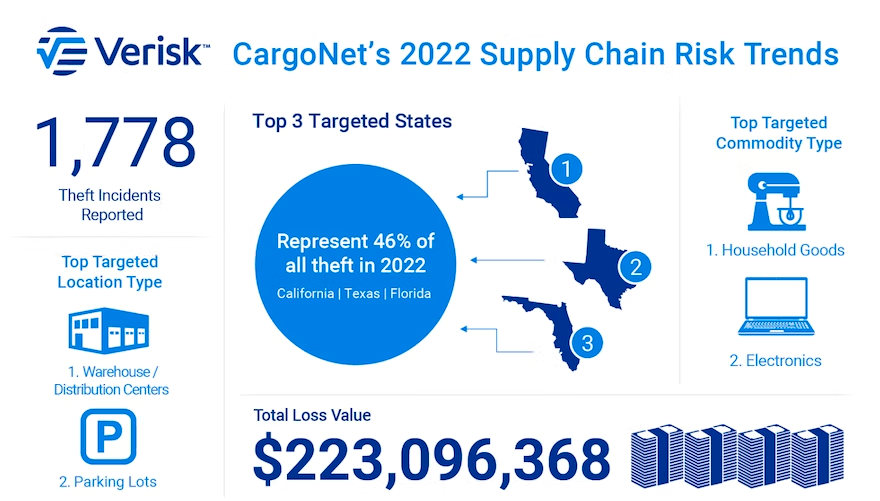Cargo theft cases increased by 15% in 2022
In 2022, the number of cargo thefts noticeably increased. Most often, thieves used the scheme of fraudulent acceptance of cargo.
Last year, there were 1778 supply chain thefts in the US and Canada in 2022. This is 15% more than in 2021. An estimated $223 million worth of cargo was stolen in 2022.
The data shows that the number of commercial vehicle theft cases increased by 17% compared to last year. The number of cargo theft events increased by 20% compared to last year. The average value of the stolen cargo was $214104.

California has the highest number of thefts, with theft in the state up 41% from 2021. Parts for computers and clean energy production were most frequently stolen.
Theft in Georgia increased by 34% compared to last year, in part due to organized crime groups that took advantage of increased traffic to the port of Savannah.
Household items were the most stolen in 2022, with household appliances and furniture becoming prime targets for long haul and last mile distribution. There also was a marked increase in the number of thefts of batches of tools and toys.
Household items are followed by electronics. The number of computer electronics decreased by 37% compared to 2021. In addition, the number of thefts of televisions and other displays nearly doubled.
CargoNet warns shippers and carriers to be on the lookout for fraudulent pickups, a «mixture of identity theft and cargo theft that can affect all parties in the supply chain.»
CargoNet said there were 96 more fraudulent pickups reported in 2022 than a year earlier, up 600% from last year.
The majority of fraudulent acceptances occurred in California (74% of the total), but such crimes are increasingly spreading throughout the country – in Washington, New Jersey, Pennsylvania, Illinois, Texas and other states.
The supply of solar modules, auto parts and vehicle maintenance products are most at risk.
The fraudulent takeover style relies heavily on subcontracting the shipment to a legitimate road carrier and misdirecting the shipment to a different address. Logistics brokers and shippers can help prevent fraudulent pickups by verifying shipping claims with the carrier against their contact information on file with the Federal Motor Vehicle Safety Administration and verifying that the name of the carrier and driver matches who the shipment was handed over to.
Road carriers should be wary of new customers offering payment through peer-to-peer (P2P) money transfer apps if the identity of the consignee is hidden and the shipments need to be delivered to an address other than the one on the bill of lading, especially if the address is a public warehouse or cross-docking in California.




